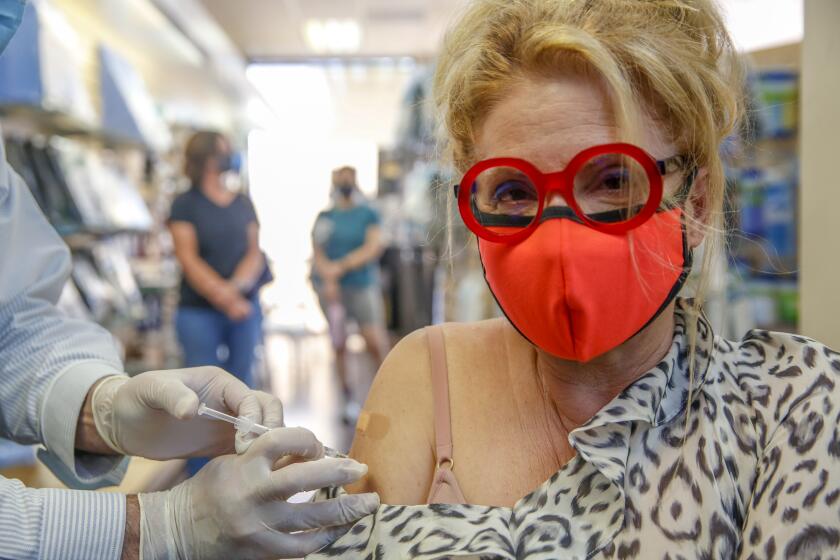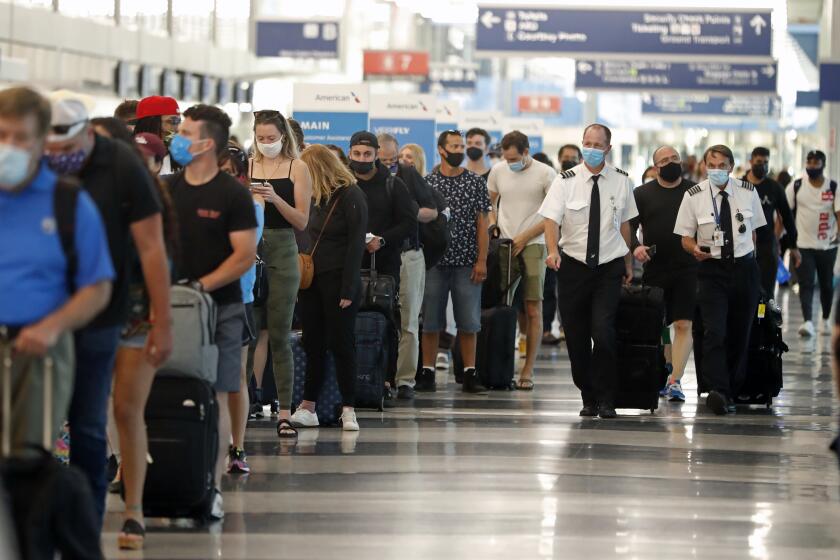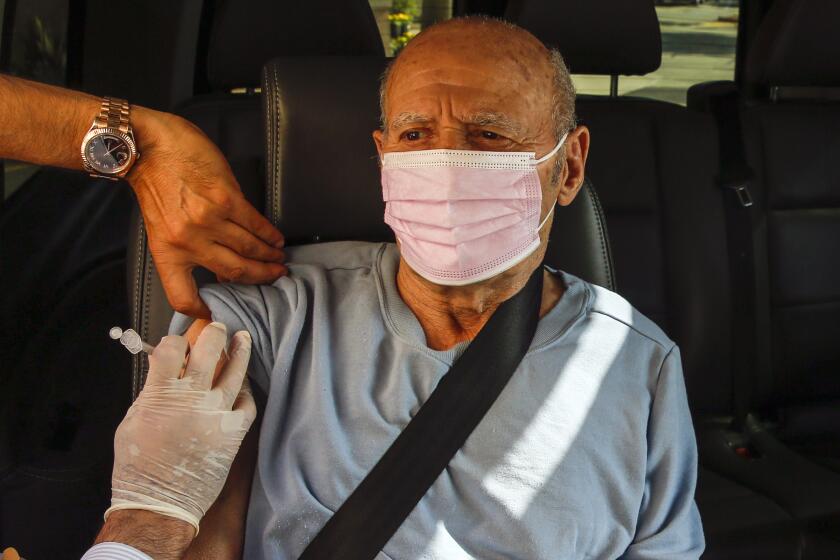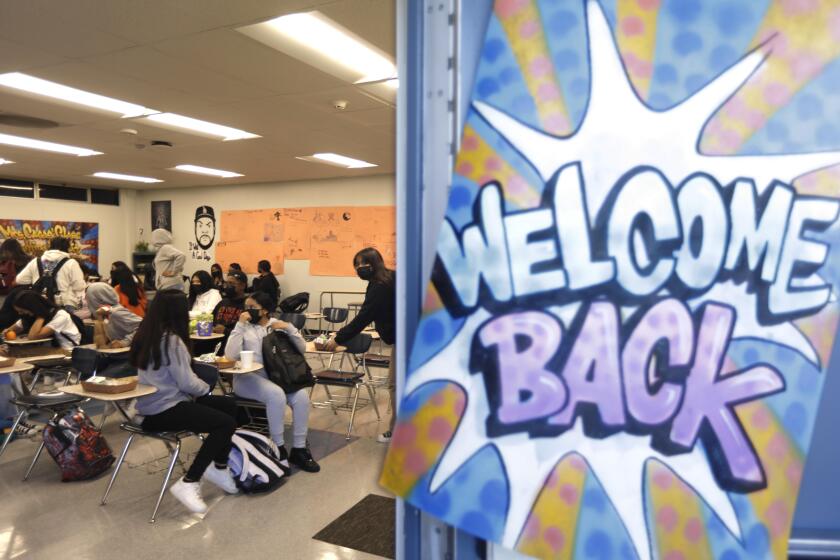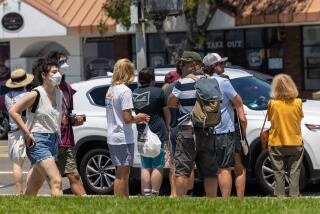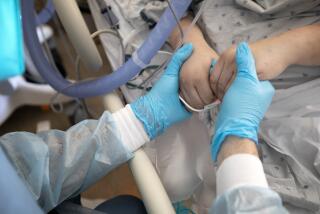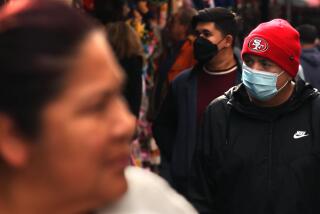California’s coronavirus cases top 5 million as hospitalizations continue to drop
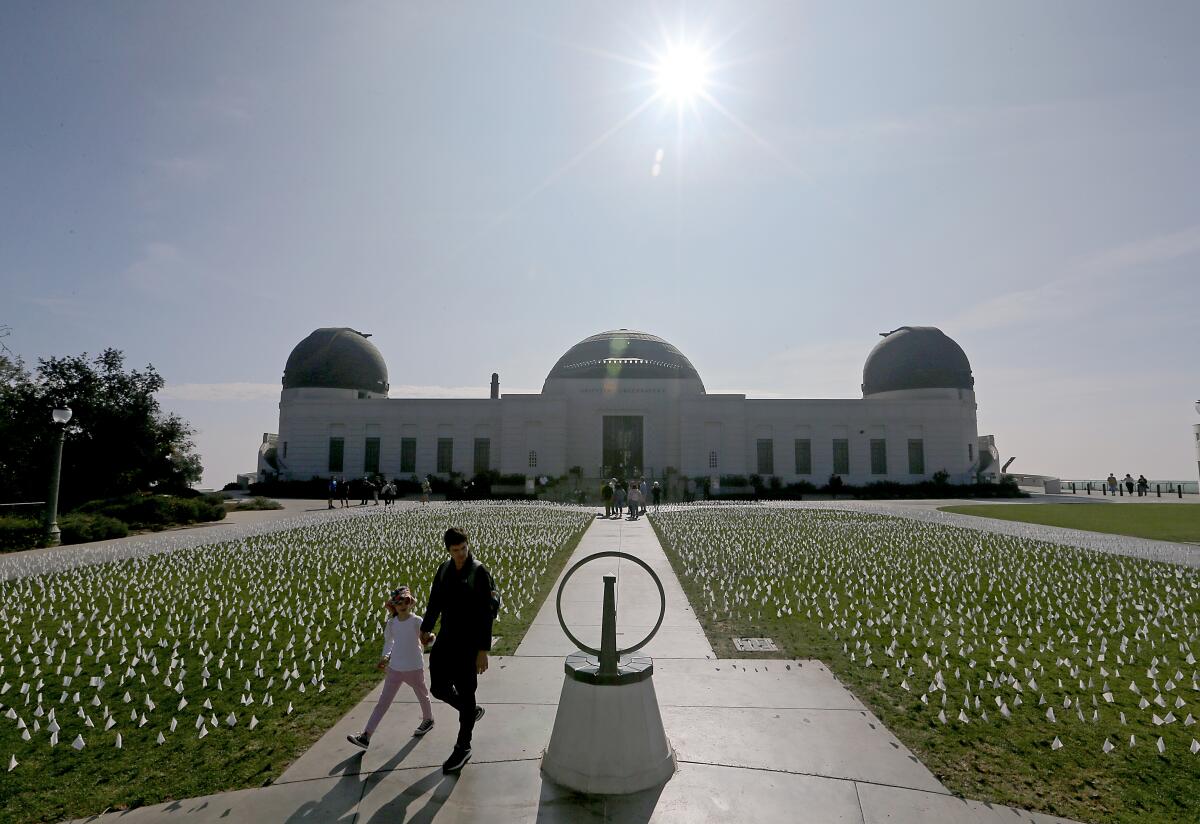
- Share via
California has now reported 5 million coronavirus cases, a sobering total that underscores the pervasiveness of the COVID-19 pandemic during its nearly two-year rampage through the state.
The milestone comes at a somewhat promising, though still precarious, time in the outbreak. The daily numbers of newly recorded infections and those hospitalized with the disease have declined in recent weeks, a welcome trend heading into the heart of the fall-and-winter holiday season.
But officials have long circled this winter on their cautionary calendar, warning that the combination of holiday travel, colder weather and increasing indoor gatherings could threaten to fuel the still-potent pandemic.
“I recognize the fear that many of us have as we now enter into the winter, as we enter into a season where — if past is prologue — we should anticipate an increase of cases, an increase in hospitalizations, an increase in people in ICUs, and tragically the likelihood, if we don’t take seriously this moment, an increase in the number of people that will lose their lives,” Gov. Gavin Newsom said this week.
As of Thursday morning, California’s reported coronavirus case count stood at 5,001,249, according to state data compiled by The Times.
Included in that total are nearly 253,000 “probable” cases — those that have been identified with an antigen test but haven’t yet been confirmed with more time-consuming and accurate PCR screening.
Still, the overall figure means that 5 million Californians have, at some point, tested positive for a coronavirus infection.
California’s cumulative number of cases that have been definitively confirmed, about 4.75 million, is easily the highest in the nation — not surprising, given the Golden State has more than 39 million residents.
Adjusting for population shows a different picture, though. Throughout the pandemic, California has reported about 12,775 coronavirus cases per 100,000 residents, the 10th-lowest of any state, Times’ data show.
By comparison, eight states — North Dakota, Alaska, Tennessee, Utah, Wyoming, South Dakota, South Carolina and Florida — have recorded rates that exceed 18,000 cumulative cases per 100,000 residents.
The FDA and CDC are expected to officially make booster shots available to all fully vaccinated adults by the end of this week.
The pace at which California’s case count grew hastened notably during the Delta coronavirus surge that struck over the summer.
California hit the 3-million case mark in mid-January. Nearly seven months later, in early August, the state reached 4 million cases.
Adding another million confirmed and probable cases took only 3½ months.
But there are signs the pandemic has lost some steam in California. Over the last week, the state has reported an average of about 4,800 new coronavirus cases per day — down nearly 22% from the level seen two weeks ago, Times’ data show.
Hospitalizations, too, are trending downward. The number of coronavirus-positive patients hospitalized statewide Wednesday was 3,409, a 28% decrease since the start of October.
The number of people traveling by air for Thanksgiving is expected to bounce back to 2019 levels, a surge the government says it’s ready to handle.
More promising still is that the downward trend has continued even after Halloween. Last year’s holiday, though far more limited and measured than normal, helped fuel what eventually would swell into the worst wave of the pandemic over the winter.
“We’re now about 2½ weeks out from Halloween, and we’re glad that we haven’t seen a surge in cases that we saw following the holiday last year,” Los Angeles County Public Health Director Barbara Ferrer said Thursday.
Several factors likely contributed to that, she said during a briefing.
“The choice made by so many families to get everyone eligible vaccinated likely had the biggest impact on safety this year. And we know that many families also made choices about how they celebrated that considered the safety of both their own and other people’s households,” Ferrer said. “We’re grateful to everyone for taking steps to make the holiday safe, and as Thanksgiving approaches, we’re hoping that similar attention to layering protections will once again make it possible for us to gather together without creating risk for increased transmission.”
California now says essentially all adults should get COVID-19 vaccine booster shots.
Still, officials are striking a cautious tone. Some other areas of the country have recently seen sharp increases in coronavirus transmission — a potential warning sign as the weather turns and the holidays approach.
As Newsom put it during a briefing Tuesday: “This virus, this disease, is not taking the winter off. It’s coming back in force, and you’re seeing that all across this country. You’re seeing it in the Dakotas. You’re seeing it in Colorado. You’re seeing it in New Hampshire, Vermont. You’re seeing it around the world.”
Federal figures underscore the challenge other states are currently facing.
Over the last seven days, California has reported 94.6 new coronavirus cases per 100,000 residents — the ninth-lowest rate of any state, according to data from the U.S. Centers for Disease Control and Prevention.
By comparison, six other states — Minnesota, Michigan, New Mexico, New Hampshire, North Dakota and Wisconsin — recorded case rates over the last week that were at least four times higher than California’s.
Health officials are urging the vast majority of adults to get a booster shot as soon as possible.
Health officials generally agree California is unlikely to face a winter coronavirus resurgence on the scale of last year, in large part because of how many residents have been vaccinated. More than 70% of all Californians have received at least one vaccine dose.
However, the experience elsewhere — even in highly vaccinated states such as New Hampshire and New Mexico — demonstrates just how readily the coronavirus can rebound.
That makes it all the more important, officials say, for unvaccinated residents to get their shots, and for those eligible for a booster to do likewise.
“As the governor said and any ‘Game of Thrones’ fan knows: Winter is coming. So we have to be prepared,” Los Angeles Mayor Eric Garcetti said Wednesday. “We should know where we’re at. I want to acknowledge how tough and confusing this moment is. The colder temperatures and increased time spent indoors just always make it easier for viruses, including COVID-19, to spread.”
Times staff writer Sean Greene contributed to this report.
More to Read
Sign up for Essential California
The most important California stories and recommendations in your inbox every morning.
You may occasionally receive promotional content from the Los Angeles Times.
